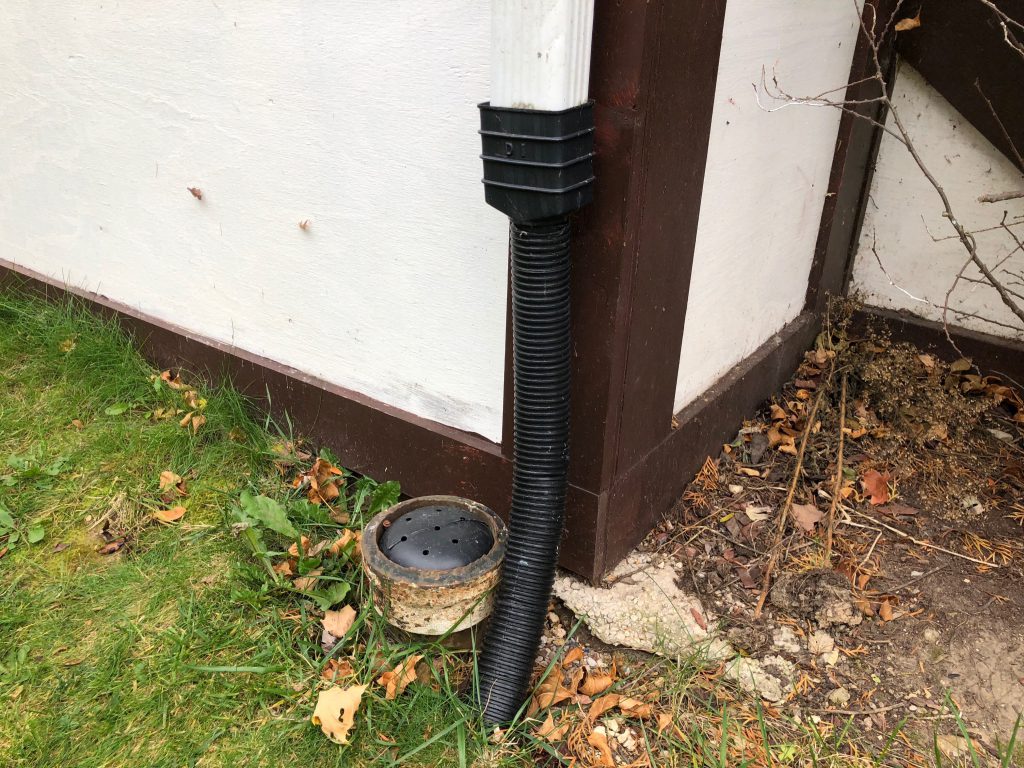Disconnect Your Downspouts, Get $100
City program affecting 54,000 homes part of plan to prevent Deep Tunnel overflows.
Approximately 54,000 Milwaukee households will get a letter this winter telling them to disconnect their downspouts from the combined sewer system. The move, designed to reduce the size and frequency of sewer overflows as well as basement backups, is a reversal of longtime city policy. The change, to be phased in by 2025, will have city residents redesigning their yards, buying rain barrels and finding other creative tricks to store water on site instead of sending it to the Deep Tunnel system operated by the Milwaukee Metropolitan Sewerage District (MMSD).
Under the common residential property setup, rain falls on the roof of a house, runs down the downspouts and eventually into the sewers, combining with other wastewater and into the Deep Tunnel system before being treated. Increasingly common heavy rains can cause the sewer system to overflow into Lake Michigan and area rivers in order to avoid water backing up into homes. Disconnecting downspouts, which can carry up to 12 gallons a minute flowing towards the sewer system, is designed to create more space for other sources of wastewater and thereby prevent overflows improving the effectiveness of the Deep Tunnel.
This has been a long time coming,” said Alderman Michael Murphy when the idea was first presented to the Common Council’s Public Works Committee in late October. “Right now to do a Deep Tunnel expansion would be billions.” According to a Department of Public Works presentation, the city intends to require all residential properties with four units or less to disconnect their downspouts from the combined sewer system by January 1st, 2025 at a cost of $7.1 million.
The city is planning to issue rebates through 2020 of up to $100 per homeowner or even having contractors perform the work. “It’s really simple. Any handy person can do it themselves,” said Nader Jaber. The DPW veteran is Engineer in Charge of the department’s Environmental Engineering division.
The city will provide a $50 per downspout rebate, up to $100 per property. Department of Neighborhood Services staff, according to Jaber, will perform an inspection after work is done to certify the rebate request. After 2020, the city will switch to property visits and fines to ensure compliance.
Not every property will be able to comply because a discharge point must be available that is five feet away from foundation walls and property lines, sloped away from any nearby structure and that does not cause ice to form on streets or sidewalks. The city will initially mail every applicable property owner, but intends in spring 2019 to follow up with those identified by an aerial imagery survey as unable to comply with the guidelines.
In response to a question from Ald. Robert Donovan about how the city could possibly know what properties are exempt, Jaber said his department has four people using Google Earth all day to identify problem properties. “It’s easy once you start doing it,” said the engineer.
Despite Jaber’s insistence that it’s easy work, one alderman isn’t convinced things will so smoothly. “You’re going to set off a panic. I can tell you that right now, ” said committee chair Ald. Robert Bauman. But Bauman doesn’t want his constituents rushing to do the work before the end of the year. “The message to homeowners is don’t do it today, wait until next year so you get your rebate,” said the alderman.
The 2019 budget, through a sewer fee increase, includes $2 million in funding for twelve new positions to execute the program. The council-approved budget includes a district code enforcement supervisor, office assistant and 10 residential code enforcement inspectors being added to the Department of Neighborhood Services.
The program was initiated by a 2014 MMSD policy change and will also impact the village of Shorewood. Not all of Milwaukee relies on the combined sewer system, but 11 of the city’s 15 aldermanic districts will be affected. Connection of downspouts to a sanitary (separated) sewer system is prevented by state law.
Commercial properties and larger residential buildings will not be required to make the change, in part because they often do not have a lawn or other area to discharge to. Jaber said they will be encouraged to participate voluntarily.
If you think stories like this are important, become a member of Urban Milwaukee and help support real independent journalism. Plus you get some cool added benefits, all detailed here.
Political Contributions Tracker
Displaying political contributions between people mentioned in this story. Learn more.
Eyes on Milwaukee
-
Church, Cupid Partner On Affordable Housing
 Dec 4th, 2023 by Jeramey Jannene
Dec 4th, 2023 by Jeramey Jannene
-
Downtown Building Sells For Nearly Twice Its Assessed Value
 Nov 12th, 2023 by Jeramey Jannene
Nov 12th, 2023 by Jeramey Jannene
-
Immigration Office Moving To 310W Building
 Oct 25th, 2023 by Jeramey Jannene
Oct 25th, 2023 by Jeramey Jannene






















I have used an extended downspout and rain barrel for years. Am I still potentially eligible for the fifty bucks?